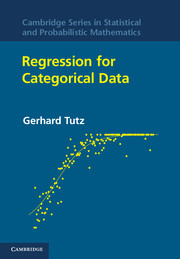Book contents
- Frontmatter
- Contents
- Preface
- 1 Introduction
- 2 Binary Regression: The Logit Model
- 3 Generalized Linear Models
- 4 Modeling of Binary Data
- 5 Alternative Binary Regression Models
- 6 Regularization and Variable Selection for Parametric Models
- 7 Regression Analysis of Count Data
- 8 Multinomial Response Models
- 9 Ordinal Response Models
- 10 Semi- and Non-Parametric Generalized Regression
- 11 Tree-Based Methods
- 12 The Analysis of Contingency Tables: Log-Linear and Graphical Models
- 13 Multivariate Response Models
- 14 Random Effects Models and Finite Mixtures
- 15 Prediction and Classification
- A Distributions
- B Some Basic Tools
- C Constrained Estimation
- D Kullback-Leibler Distance and Information-Based Criteria of Model Fit
- E Numerical Integration and Tools for Random Effects Modeling
- List of Examples
- Bibliography
- Author Index
- Subject Index
9 - Ordinal Response Models
Published online by Cambridge University Press: 05 June 2012
- Frontmatter
- Contents
- Preface
- 1 Introduction
- 2 Binary Regression: The Logit Model
- 3 Generalized Linear Models
- 4 Modeling of Binary Data
- 5 Alternative Binary Regression Models
- 6 Regularization and Variable Selection for Parametric Models
- 7 Regression Analysis of Count Data
- 8 Multinomial Response Models
- 9 Ordinal Response Models
- 10 Semi- and Non-Parametric Generalized Regression
- 11 Tree-Based Methods
- 12 The Analysis of Contingency Tables: Log-Linear and Graphical Models
- 13 Multivariate Response Models
- 14 Random Effects Models and Finite Mixtures
- 15 Prediction and Classification
- A Distributions
- B Some Basic Tools
- C Constrained Estimation
- D Kullback-Leibler Distance and Information-Based Criteria of Model Fit
- E Numerical Integration and Tools for Random Effects Modeling
- List of Examples
- Bibliography
- Author Index
- Subject Index
Summary
When the response categories in a regression problem are ordered one can find simpler models than the multinomial logit model. The multinomial logit wastes information because the ordering of categories is not explicitly used. Therefore, often more parameters than are really needed are in the model. In particular with categorical data, parsimonious models are to be preferred because the information content in the response is always low.
Data analysts who are not familiar with ordinal models usually seek solutions by inadequate modeling. If the number of response categories is high, for example in rating scales, they ignore that the response is ordinal and use classical regression models that assume that the response is at least on an interval scale. Thereby they also ignore that the response is categorical. The result is often spurious effects. Analysts who are aware of the ordinal scale but are not familiar with ordinal models frequently use binary regression models by collapsing outcomes into two groups of response categories. The effect is a loss of information. Armstrong and Sloan (1989) demonstrated that the binary model may attain only between 50 and 75% efficiency relative to an ordinal model for a five-level ordered response; see also Steadman and Weissfeld (1998), who in addition consider polytomous models as alternatives.
One may distinguish between two types of ordinal categorical variables, grouped continuous variables and assessed ordinal categorical variables (Anderson, 1984). The first type is a mere categorized version of a continuous variable, which in principle can be observed itself.
Information
- Type
- Chapter
- Information
- Regression for Categorical Data , pp. 241 - 268Publisher: Cambridge University PressPrint publication year: 2011
